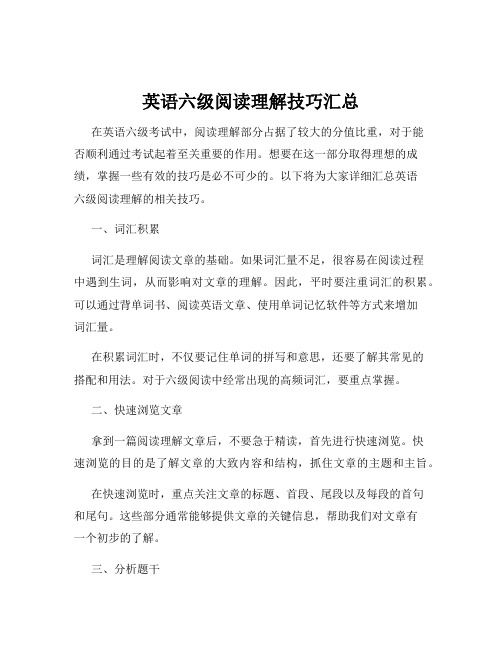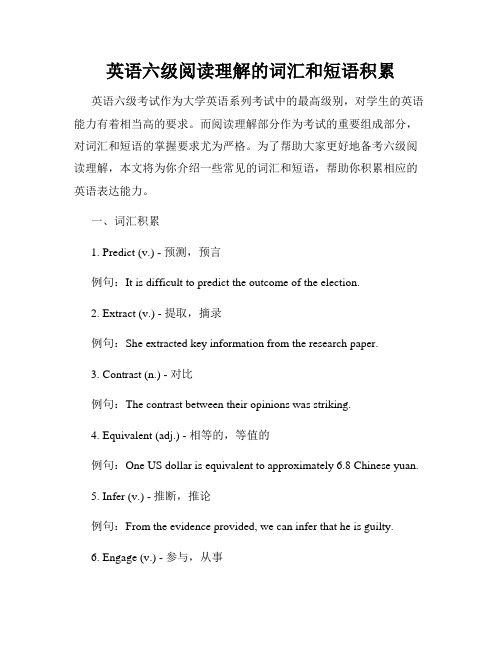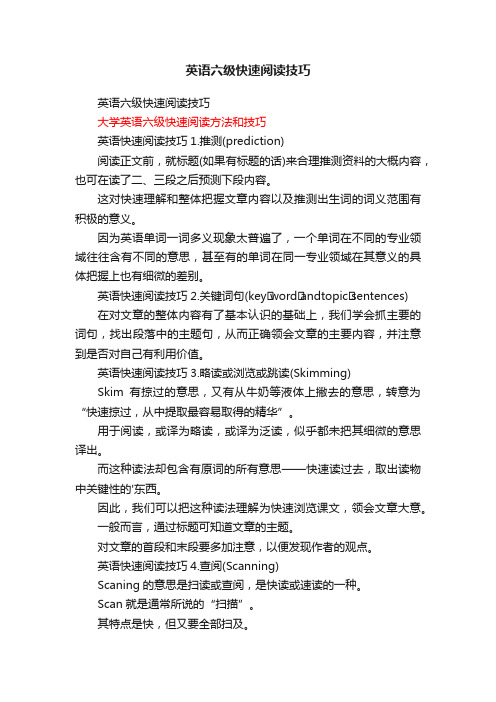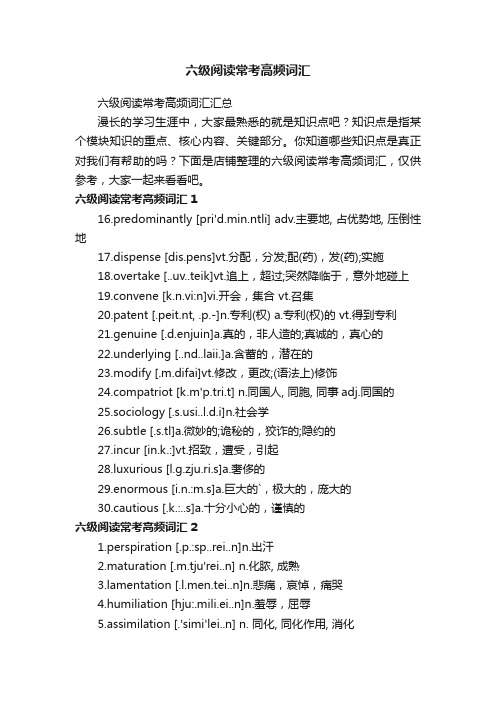英语六级阅读备考技巧及词汇(六)
六级阅读中的词汇题解题技巧

六级阅读中的词汇题解题技巧在英语六级阅读中,词汇题是常见的考点之一。
掌握一些解题技巧能够帮助我们更好地理解文章,准确回答问题。
本文将介绍几种常用的解题方法,帮助大家提升解答词汇题的能力。
一、词义猜测法很多时候,我们遇到不认识的词汇时,可以通过周围的语境来进行猜测。
文章中通常会给出一些线索,比如同义词、反义词、解释、举例等,通过学会捕捉这些线索,我们可以更加准确地猜测出词义。
例如,文章中可能会有这样的句子:“The new museum is a popular attraction for tourists, who come from all over the world to see its exquisite collections.” 这句中的词汇“exquisite”可能不为我们所熟知,但通过前面提到的“museum”和“popular attraction”可以猜测出“exquisite”是形容“collections”的,即“精美的”或“优秀的”。
二、词根词缀法很多英语单词都有固定的词根和词缀,学会词根词缀的含义可以帮助我们更好地理解和解答词汇题。
例如,“un-”表示否定,“-able”表示能够,通过学会这些常用的词根和词缀,我们可以更快地判断出词义。
例如,词汇题中可能会给出这样的选项:“A. impossible, B. imperfect, C. important, D. irrelevant”,通过词缀“im-”表示否定,我们可以确定选项B “imperfect”是正确的答案。
三、上下文逻辑法阅读文章时,要注意上下文之间的逻辑关系。
有时候,通过上下文的逻辑推理可以帮助我们确定词义。
特别是当文章中存在转折、因果、总结等关系时,要善于利用这些线索进行推断。
例如,文章中可能会有这样的句子:“The company implemented a series of cost-cutting measures in order to improve its financial performance. However, the strategy backfired and caused further losses.” 在这个例子中,我们可以通过上下文的逻辑关系,推断出“backfired”表示策略失败或起到反作用的意思。
英语六级词汇背诵学习技巧

英语六级词汇背诵学习技巧英语六级词汇背诵学习技巧在阅读和使用中背单词阅读分精读与泛读。
泛读宜选用通篇生词不是很多的*,用略读的方法通读全文,全部看完之后再回头看不认识的生词,可记录在笔记本上,以备复习;精读可挑选考试真题阅读*,从头到尾精读单词、句子,做详细记录。
*出现的高频词做详细记录。
学习之余还可以多注意身边的英语,如产品说明书上的而英语,各种警示语、标语等。
少时多次重复记忆单词不应该对着单词死记硬背直到记下为止,这种记忆只会停留在表面,用不了多久就会网的一干二净。
正确方法应该是多次重复,并降低每个单词消耗的时间。
巧用音标读出来记住发音,会让你更容易记住单词。
英语中字母之间是有发音规则的,先学这些发音规则,再背单词,还能为练习口语和听力打基础。
避免单纯的抄写记忆单纯抄写单词,大脑没有同步记忆,效果并不好。
记忆单词的发音比记住单词的拼写更容易,也更重要。
学会根据发音写单词,是单词学习的好方法。
由一个单词再到易混单词大量背单词时有许多易混单词,难以区分。
可以先熟悉其中一个单词,对这个单词掌握得差不多了,再去背与之对应的易混单词。
从常用搭配中记单词有些词经常以词组的形式出现,记住常用搭配,可能会让你更容易记忆单词,而且印象也更深刻。
同时记住的常用搭配在翻译和写作中也经常会用到,一举两得。
巧用记忆曲线尽量在记忆衰减前对已看过的单词进行重复,强化它们在大脑中的印象,10-15天正好是记忆衰减的周期。
可以按照需要记忆的单词总量进行划分,得到每天要看的单词量。
零散时间多记忆每天花数小时背单词的方法效果并不好,长时间枯燥记忆易造成催眠效应。
利用零散时间背单词,如5-10分钟的时间段来替代整块时间,能提高学习效率。
随身携带小卡片、单词复习本在起床十分钟、饭前十分钟、睡前十分钟等零散时间记忆。
不但效率高,还能在不同时段巩固记忆。
英语六级词汇objective目标;客观的participate 参加,参与premium 奖品,奖金;额外津贴;高价的,优质的preserve 保护;保持;腌渍privilege 特权,特许;荣幸prompt 促进,激起;迅速的purchase 购买;购买的物品reflect 反射;反省,细想reject 拒绝;丢弃scan 细看,审视;浏览;扫描shift 移动;转嫁,转给;轮班,换班shortage 不足,缺少source 源(泉),源头;****,出处(= origin)stuff 原料;填满;让…吃饱submit 呈送,提交;主张,建议;服从,屈服superior 卓越的,优良的;较…多的,优于;地位(或级别)较高的;上级,长官temper 脾气,情绪testify证实;说明threaten 威胁,恐吓;预示(某事)transform 使改变,使转化,使变化trend 趋势,倾向unique 唯一的;极不寻常的abandon 抛弃;放弃;放纵,纵情abundant 充分的,充裕的,丰富的accommodate 向…提供住处(或膳食);容纳,收容;顺应,适应accustom 使习惯acknowledge 承认…的权威(或主张);告知(信件、礼物等)已收到,确认;对(礼物)表示感谢acquire 取得,获得;学到aggressive 侵略的,好斗的;[褒]有进取心的alien 外国的;不相容的;(from) 相异的,陌生的;外侨,外来者;外星人英语六级词汇大全transcend 超出,超越(经验、理性、信念等的)范围transient 短暂的,转瞬即逝的transit 运输,载运transmit 传播,发射;传导,传递ultimate 最后的,最终的;根本的;终极,顶点,极限underlying 在下面的;含蓄的,潜在的unify 使联合,统一;使一致unveil 除去…的面纱(盖布)等,揭开;为…揭幕汇总:20__年6月大学英语六级高频词汇大全activate 使活动,启动;激活,使活化administer 掌管,管理;实施,执行;给予,用(药)advanced 先进的,高级的,前进的advisable 可取的,明智的affection [广义]影响;[狭义]爱,慈爱,感情affiliate 使隶属(或附属)于;附属机构,分公司afflict 使身体(或精神)痛苦,折磨aggravate 使加重,使恶化,加剧aid 帮助,援助,救助(first aid 急救)allergic (to)过敏(性)的allocate 分配,分派,把…拨给allowance 津贴,补助(费),零花钱;体谅,考虑ally 同盟国;同盟者,支持者;(with)(使)与…结盟,(使)联合alternate 交替,轮流;交替的,轮流的;间隔的alternative 可供选择的事物,替换物;取舍,抉择;二者择一的ample 充分的,富裕的(←→ scanty);宽敞的,宽大的analyze/-yse 分析,分解;细查,细察anniversary 周年(纪念日)anonymous 匿名的;无名的;无特色的apartment (BrE)房间,套间;(AmE)公寓arrest 逮捕,扣留artificial 人工的,人造的;[喻]矫揉造作的,人为的assault (on)攻击,袭击assemble (人)集合,集会;(物)装配,组装assign 分配,委派assure 使确信,使放心;保证,担保authorize 授权,认可,批准avert 转移(目光、注意力等);避免,防止bachelor [亦作B-]学士(学位) [Master 硕士(学位);Doctor 博士(学位)];单身汉bankrupt 破产的;彻底缺乏的;使破产;破产者urban 城市的urge 催促,力劝;鼓励,促进;强烈希望;强烈欲望utmost 极度的,极端的;极限,极度,最大可能utter 彻底的,完全的;发出(声音),说vary (with)(随…而)变化,改变;改变,使多样化verge 边,边缘;接近,濒临version 型,版本;译本,译文;说法,看法vessel 船,舰;容器,器皿;管,血管volume 卷,册;容积,体积,容量;音量,响度voluntary 自愿的,志愿的(←→ compulsory)vow 誓言,誓约;立誓,起誓vulnerable 易受伤的,脆弱的;易受攻击的,难防御的whereas 而,却,反之withdraw (withdrew; withdrawn)收回,撤销;缩回,退出abnormal 反常的,不正常的abort (使)中止,(使)夭折;(使)流产,堕胎abundance 丰富,充裕academy 学院,研究会accompany 陪伴,伴随;为…伴奏;和…一起发生accordance 一致,和谐accuse控告;谴责,指责acquaint 使了解;使认识大学英语六级单词背诵技巧一、串联记忆首先,什么叫串联记忆呢?简单点说就是通过一个单词,拓展出去,找到相应的同义词和反义词,从而记住一长串词汇。
大学英语六级阅读理解应试技巧

大学英语六级阅读理解应试技巧大学英语六级是一个越来越重要的考试,考生需要用心准备,特别是在阅读理解部分。
以下是一些应试技巧,可以帮助你提高阅读理解的能力,更好地应对六级考试。
一、了解题型六级阅读理解一般有三种题型:选择题、填空题和匹配题。
选择题通常有四个选项,填空题有多个空需要填写,匹配题需要将两个部分进行匹配。
在备考时需要仔细研究这些题型,理解不同题型的规则和策略。
二、抓住关键词阅读理解的关键在于理解文章的主旨,而抓住关键词能帮助考生更好地理解文章。
每段阅读理解通常有一个中心思想,这个中心思想通常出现在开头、结尾或重要段落中。
考生应该重点关注这些段落,并抓住文章中的关键词来理解和分析文章。
三、注意文章结构在阅读理解时,文章结构对于理解文章非常重要。
考生应当学会如何快速理解文章的结构,包括文章的段落划分和逻辑结构。
段落通常有主题句和支持句,这些句子可以帮助理解文章的主要观点。
同时,通过分析段落之间的关系,可以更好地理解文章整体的逻辑结构。
四、运用正确的推理技巧在阅读理解中,推理技巧是提高答案正确率的一种重要方法。
通过运用正确的推理技巧,考生可以更准确地理解文章,并找到正确的答案。
例如,推断答案、辨别作者的态度和意图、推断关系等等,都是非常重要的推理技巧。
五、练习练习是提高阅读理解能力的关键。
考生应该尽可能多地练习六级阅读理解,并学会正确的做题方法和策略。
同时,正确地检查答案也是非常重要的,可以帮助发现并纠正自己的错误。
最后,对于六级阅读理解,准确地理解文章、正确地抓住关键词和运用推理技巧,都是取得高分的必备条件。
希望以上的技巧能帮助大家更好地备考并应对六级考试。
六级阅读做题技巧和训练方法

六级阅读做题技巧和训练方法
六级阅读做题技巧和训练方法如下:
1. 阅读技巧:
- 阅读题目前先阅读文章,了解文章大意和结构,找出重点
段落和关键词。
- 注意文章的逻辑关系和语境,理解文章的主题、目的和作
者态度。
- 熟练掌握词汇和短语的含义,遇到生词要标注并查询意义。
- 注意文章中的转折词、关联词和指代词,理解句子之间的
连接关系。
- 注意文章中的数字、图表和例子,能够理解和提取相关信息。
2. 训练方法:
- 多读英文文章,包括新闻、杂志、学术论文等,提高阅读
速度和理解能力。
- 刷真题,熟悉考试的题型和常见考点,分析自己的错误原因,总结出有效的解题思路。
- 进行模拟考试,限时完成阅读题目,提高解题速度和应对
压力的能力。
- 制定学习计划,每天坚持练习阅读题目,并进行错题总结
和订正。
- 参加英语阅读训练班或找老师进行辅导,获得更系统的指
导和反馈。
以上是六级阅读做题技巧和训练方法,希望对你有帮助!。
英语六级阅读做题技巧(精选4篇)

英语六级阅读做题技巧(精选4篇) 英语六级阅读做题技巧(精选4篇)六级快速阅读占到六级成果的一小部分,特点是信息量大,篇幅长,快速锁定需要的信息是关键因素,下面我给大家共享英语六级阅读做题技巧,期望能够帮忙大家!英语六级阅读做题技巧【篇1】并非全部的题目都如 Why is the king always lucky? 这么简洁,尤其是问主题思想的,这时我们还要恋战吗?答案是否定的。
因此,这时肯定要先划上一个,你就有了1/4的机会,这样也比你不填要好。
5.分析出题人的思路这里解释为什么要用带解释的书而非全是A B C D 的书。
由于我们选择答案,说究竟就是迎合出题人的思路。
这个现实是很残酷的,因此,假如要有一个高正确率,最好的方法就是了解出题人是怎么想的,我选择的答案和他的想法哪里不符,和原文哪里不符?同时用马克笔将这些关键部分、错误部分划出。
6.复习复习的最好方法就是在早读的时候把文章当“美文”来读,马克笔划出的部分肯定要认真体会,达到流利的程度。
英语六级阅读做题技巧【篇2】1.确定答题时间假如你认真仔细地依据上述工具进行了预备。
那么应当很清晰这部分的答题要求了。
请先回答我一个问题:这部分总共有几道大题?嗯。
整份试卷你安排在这部分的时间是多少?嗯。
你的回答可能是:20分钟。
那么每道大题的时间是5分钟,没错。
2.练习扫读告知你吧,有的题就是读不完的。
这些题就不是让你来读完的。
换一句话说,即使读完了,也是没有意义的。
因此,学习扫读是很有必要的。
放心,扫读不是什么特别的技巧,只是选择主要信息,因此谁都可以做到。
有信念吗?请连续往下看3.确定扫读目标确定目标的方法很简洁。
那就是直接从文章后面的题目中提取关键词。
比如:Why is the king always lucky? 我们就可以知道我们在阅读时要留意,凡是关于国王幸运缘由的部分都应当留心。
英语六级阅读做题技巧【篇3】1.阅读题目以猜测文章内容应当先读题目,后看文章,同时依据题目设想一下文章可能涉及的内容,以及所使用的词汇量的类型与范围,乃至题目涉及到的关键性的词汇。
大学英语六级阅读训练有哪些技巧

大学英语六级阅读训练有哪些技巧大学英语六级阅读训练有哪些技巧在大学英语六级的考试中,我们可以通过哪些技巧来做好阅读部分的训练呢?为此店铺为大家带来大学英语六级阅读部分训练的技巧。
大学英语六级阅读训练技巧首先,快速阅读的主要做题步骤如下:1.看大标题(主要是了解文章大意)2.选定位词3.读文解题4.查漏补缺下面我们来对各个步骤进行详细讲解:一、选定位词注意要去选那些不易替换、文中原样重现的词语,如:•数字、时间•大写专有名词:人名、地名、机构名……•特定概念:合成词、专业概念、独特说法、偏具体的名词二、读文解题扫读,时刻注意定位词的出现•段首、段末•数字、专有名词丰富的区域•段中转折、强调处•识别同义改写三、查漏补缺•先确定来源明显的句子,一般有约7个句子来源明显•第一遍无法确定来源的句子,注意结合每段主题、话题词、态度方向筛选下面再为大家总结做题要点,来帮助大家对长篇阅读有一个整体的概念。
•不求甚解:重点是看到,而非看懂•先题后文:先定句子定位词•匀速扫读:无需慢速精读,也莫过快略读;保持适中速度,时刻关注对应•有取有舍:优先确定来源明显的句子,先把简单题选出来,不要影响答题时间。
大学英语六级阅读答题技巧1) 略读步骤所谓略读,顾每思义是一种省略的读法。
略读,能够让你以最快的速度阅读,选择性地遗漏某些细节内容,目的是获得文章的主旨大意。
在回答主旨题目的时候,略读就能派上用场。
不仅如此,进行略读有助于我们了解文章的大意、作者的观点,这样对我们做推论题也大有裨益。
这种选择性的阅读方法,特点是“省略细节找主旨”,注重对全文整体内容的把握。
但是,这里需要强调,“省略细节”是选择性的省略。
因为主旨也是可以从一些细节中透露出来的,所以有些细节是有助于我们掌握大意的。
那么在略读的过程中,关键点就是更多地关注并抓住文章中这些标志性的词句,例如文章的标题、章节标题、斜体字、黑体字、每段的开头和结尾、以及文章中能够代表观点的句子。
英语六级阅读备考中的阅读技巧总结

英语六级阅读备考中的阅读技巧总结在备考英语六级阅读时,掌握有效的阅读技巧可以帮助我们更好地理解文章内容,提高解题速度和准确度。
本文将总结一些常用的阅读技巧,帮助大家在考试中取得好成绩。
一、理解文章结构阅读一篇英语文章时,首先要了解文章的结构。
通常,英语文章的结构包括引言、主体段落和结论。
通过理解这种结构,我们可以更好地把握文章的主题和信息的组织方式,有助于快速定位关键信息。
二、快速浏览全文在开始阅读之前,可以先快速浏览全文,了解文章的大致内容和段落结构。
通过阅读标题、副标题、首尾句和粗体字等强调部分,可以快速掌握文章的主题和重点,有利于我们在深入阅读时有针对性地搜索所需信息。
三、学会略读与精读结合阅读时,我们可以根据需要进行略读和精读的结合。
略读是指快速阅读,着重获取关键信息,例如文章的主题、中心思想、关系等;而精读则是深入理解文章的详细内容,包括作者的观点、论据和事实依据等。
合理使用略读和精读的技巧,可以提高阅读的效率和准确度。
四、积累词汇和短语扩大英语词汇量是备考英语六级阅读的基础。
平时要注重积累词汇和短语,特别是一些常见的学科词汇和熟悉的话题词汇。
掌握足够的词汇量,可以帮助我们更好地理解文章,减少在阅读过程中查字典的时间。
五、注意上下文关联在阅读一篇文章时,重要的信息往往会与其他句子或段落产生关联。
我们需要注意上下文的关联,通过逻辑推理来理解词语、短语或句子的准确含义。
此外,我们还可以注意标点符号的使用和词汇的语法特点,来推断上下文的含义。
六、关注关键词在阅读一道题目时,关注关键词可以帮助我们快速定位和理解问题。
关键词可能包括数字、时间、地点、人物名称等。
通过识别和理解这些关键词,我们可以迅速确定信息的重要与非重要,提高解题效率。
七、练习阅读技巧提高在英语六级阅读中的表达流畅度和准确性,需要通过大量的练习。
可以选择一些经典的阅读材料,注重练习各类题型的技巧训练。
通过不断地练习,我们能更好地熟悉文章结构、理解作者意图,并提高阅读的整体水平。
英语六级考试阅读单词

英语六级考试阅读单词英语六级考试阅读必备单词单词是参加大学英语六级考试的基础,考生在备考阅读理解时可以了解一些必备的单词。
下面就让店铺给大家分享大学英语六级考试阅读理解必备单词吧,希望能对你有帮助!英语六级阅读必备单词:M开头more often than not 时常,在更多情况下not more than 至多;不比…更what is more 而且;更重要的是at most 最多,至多,不超过make the most of 充分利用;极为重视move about 走来走去,总是搬家move off 离去,走掉 move on 继续前进as much as 尽…那样多;差不多make much of 重视;充分利用much less 更不 much more 更加,何况not much of a 不是一个好的not so much...as... 与其说是…不如说是…not think much of 对…估价不高without so much as 甚至于不…make beds 铺床叠被make down 改小(衣服)make for 走向,向…前进;冲向make fun of 嘲笑;开…玩笑make off with 携…而逃make one's way 前进;成功,发迹make out 开列;书写;辩认出make out of 用…制造出;理解英语六级阅读必备单词:D开头day in day out 日复一日地,天天day after day 日复一日地every other day 每隔一天have one's day 走运;正在得意的时候one day (过去或将来的.)某一天the other day 在不久前某天to a day 一天也不差without day 不定期;无限制(休会)a good deal 许多,大量;…得多deal in 经营deal out 分配,分给deal with 做买卖;处理;安排make a deal with 与…做买卖;和…妥协get into debt 借债,负债in debt to sb. 欠某人的债out of debt 不欠债decide for 作对…有利的决定decide on 选定,决定dedicate to 献(身);把…用在…take delight in 以…为乐depart from 离开,起程;开出derive from 取得;起源;由来英语六级阅读必备单词:H开头hold...against 记恨hold back 踌躇,退缩不前,阻止hold down 压制;抑制(热情等)hold in 约束,抑制hold office 担任公职hold on 握住不放;坚持下去hold on to 紧紧抓住;控制,克制hold oneself in 尽力不叫hold one's own 坚守住,不被打败hold out 伸出;坚持;支持hold up 举起;耽搁;抢劫hold water (容器等)盛得住水lay hold of 握住;控制住;占有at home 在家,在国内;自在in one's honour 向…表示敬意keep house 管理家务;做家务How about? …如何?…怎么样? hurry up (使)赶快;迅速完成in a hurry 匆忙;立即,很快地。
六级阅读理解做题技巧

六级阅读理解做题技巧
x
一、了解文章的大意
1. 找出文章主题句:在文章中,一般情况下,主题句往往出现在文章的开头或结尾。
因此,阅读文章的最佳方法是,先快速浏览全文,以便找出文章的主题句,从而把握文章的大意。
2. 注意段落的组织:要想准确地理解文章的意思,必须要了解段落之间的内在关系,由此来判断文章的组织结构。
3. 重点阅读:注意重点阅读,在阅读的过程中,要注意找出文章的重点,去掉文章中的细节性内容,以便把握文章大意,而不要去理解每一个细节。
二、选择正确答案
1. 根据题干中所提供的信息,快速浏览文章,找出能够答案题干问题的关键词,然后识别文中出现的相关词语,最后选择出正确答案。
2. 将题目分解成小问题,根据小问题的提示信息,在文中找出证据,从而判断出正确的答案。
3. 如果某道题型难以确定,可以结合其他题干问题进行把握,以期做出正确的选择。
三、其他技巧
1. 归纳概括:在做阅读理解题时,要积极归纳概括文章内容,以便把握文章大意。
2. 寻找关联:阅读理解题型中,有可能出现一道题干问题中涉及到多个段落的内容。
此时,要寻找这些段落之间的含蓄关联,以便把握整个阅读文章的意义。
3. 加强反馈:在做题过程中,加强反馈检查,从而不断改正做题中出现的错误。
英语六级阅读理解技巧汇总

英语六级阅读理解技巧汇总在英语六级考试中,阅读理解部分占据了较大的分值比重,对于能否顺利通过考试起着至关重要的作用。
想要在这一部分取得理想的成绩,掌握一些有效的技巧是必不可少的。
以下将为大家详细汇总英语六级阅读理解的相关技巧。
一、词汇积累词汇是理解阅读文章的基础。
如果词汇量不足,很容易在阅读过程中遇到生词,从而影响对文章的理解。
因此,平时要注重词汇的积累。
可以通过背单词书、阅读英语文章、使用单词记忆软件等方式来增加词汇量。
在积累词汇时,不仅要记住单词的拼写和意思,还要了解其常见的搭配和用法。
对于六级阅读中经常出现的高频词汇,要重点掌握。
二、快速浏览文章拿到一篇阅读理解文章后,不要急于精读,首先进行快速浏览。
快速浏览的目的是了解文章的大致内容和结构,抓住文章的主题和主旨。
在快速浏览时,重点关注文章的标题、首段、尾段以及每段的首句和尾句。
这些部分通常能够提供文章的关键信息,帮助我们对文章有一个初步的了解。
三、分析题干在阅读文章之前,认真分析题干是非常重要的。
通过题干,我们可以了解题目所考查的内容和重点,从而有针对性地在文章中寻找答案。
要注意题干中的关键词,如人名、地名、时间、数字等。
这些关键词能够帮助我们快速定位到文章中的相关内容。
四、带着问题阅读在对题干进行分析后,带着问题去阅读文章。
这样在阅读过程中能够更加集中注意力,提高阅读效率。
当读到与问题相关的内容时,要放慢速度,仔细阅读和分析,从中寻找答案。
同时,要注意文章中的转折词、因果词等逻辑关系词,这些词往往能够提示重要的信息。
五、善于推理判断有些题目可能需要我们根据文章中的信息进行推理和判断。
在这种情况下,要结合文章的整体内容和逻辑,进行合理的推测。
但要注意,推理和判断必须基于文章所提供的信息,不能主观臆断或过度猜测。
六、注意细节细节题在六级阅读理解中也经常出现。
对于这类题目,要仔细阅读文章中与题目相关的部分,注意一些具体的数据、事实、例子等。
同时,要注意一些容易被忽略的细节,如标点符号、括号内的内容等,这些都可能包含重要的信息。
英语六级阅读理解的词汇和短语积累

英语六级阅读理解的词汇和短语积累英语六级考试作为大学英语系列考试中的最高级别,对学生的英语能力有着相当高的要求。
而阅读理解部分作为考试的重要组成部分,对词汇和短语的掌握要求尤为严格。
为了帮助大家更好地备考六级阅读理解,本文将为你介绍一些常见的词汇和短语,帮助你积累相应的英语表达能力。
一、词汇积累1. Predict (v.) - 预测,预言例句:It is difficult to predict the outcome of the election.2. Extract (v.) - 提取,摘录例句:She extracted key information from the research paper.3. Contrast (n.) - 对比例句:The contrast between their opinions was striking.4. Equivalent (adj.) - 相等的,等值的例句:One US dollar is equivalent to approximately 6.8 Chinese yuan.5. Infer (v.) - 推断,推论例句:From the evidence provided, we can infer that he is guilty.6. Engage (v.) - 参与,从事例句:The students were fully engaged in the discussion.7. Evident (adj.) - 显而易见的例句:Her success is evident from her hard work and dedication.8. Adapt (v.) - 适应,改编例句:He had to adapt quickly to the new working environment.9. Acquire (v.) - 获得,学到例句:It takes time to acquire new skills.10. Bias (n.) - 偏见例句:The news article had a clear bias against the government.二、短语积累1. On the contrary - 正相反例句:Many people believed he was guilty, but on the contrary, he was innocent.2. In contrast to - 与...形成对比例句:In contrast to his noisy neighbors, he prefers peace and quiet.3. Inevitably - 不可避免地例句:With the increasing popularity of smartphones, technological advancements are inevitably accelerating.4. By means of - 通过,借助例句:She learned to play the guitar by means of online tutorials.5. In terms of - 就...而言例句:In terms of cost, renting is often more affordable than buying.6. In the long run - 从长远来看例句:Although the initial investment is high, solar energy is cost-effective in the long run.7. In accordance with - 根据,按照例句:The decision was made in accordance with the rules and regulations.8. As a result - 结果例句:He neglected his studies, and as a result, he failed the exam.9. On the basis of - 基于,根据例句:The report was written on the basis of extensive research.10. Be exposed to - 接触到例句:Children are often exposed to various forms of advertising.三、总结通过积累和运用这些常见的词汇和短语,你可以提高你在英语六级阅读理解中的理解能力和表达能力。
英语六级快速阅读技巧

英语六级快速阅读技巧英语六级快速阅读技巧大学英语六级快速阅读方法和技巧英语快速阅读技巧1.推测(prediction)阅读正文前,就标题(如果有标题的话)来合理推测资料的大概内容,也可在读了二、三段之后预测下段内容。
这对快速理解和整体把握文章内容以及推测出生词的词义范围有积极的意义。
因为英语单词一词多义现象太普遍了,一个单词在不同的专业领域往往含有不同的意思,甚至有的单词在同一专业领域在其意义的具体把握上也有细微的差别。
英语快速阅读技巧2.关键词句(key•word•andtopic•sentences)在对文章的整体内容有了基本认识的基础上,我们学会抓主要的词句,找出段落中的主题句,从而正确领会文章的主要内容,并注意到是否对自己有利用价值。
英语快速阅读技巧3.略读或浏览或跳读(Skimming)Skim有掠过的意思,又有从牛奶等液体上撇去的意思,转意为“快速掠过,从中提取最容易取得的精华”。
用于阅读,或译为略读,或译为泛读,似乎都未把其细微的意思译出。
而这种读法却包含有原词的所有意思——快速读过去,取出读物中关键性的'东西。
因此,我们可以把这种读法理解为快速浏览课文,领会文章大意。
一般而言,通过标题可知道文章的主题。
对文章的首段和末段要多加注意,以便发现作者的观点。
英语快速阅读技巧4.查阅(Scanning)Scaning的意思是扫读或查阅,是快读或速读的一种。
Scan就是通常所说的“扫描”。
其特点是快,但又要全部扫及。
Scan这个词的词义似乎矛盾,它既可以理解为“仔细地审视”,也可以理解为“粗略地浏览”。
这种情况倒成了扫读的绝好证明。
从形式上看,扫读是粗粗地一扫而过,一目十行,但从读者的注意方面来看,却又是高度的集中,在快速阅读中仔细挑出重要的信息。
因此,查阅可以理解为迅速找出文章中的有关事实细节或某一具体信息;有时要找出某一个单词或词组,如人名、地名、日期、价格等;有时要找出文中所述的某一特殊事件,而这一事件可能是由一个词或短语交代的。
英语6级阅读做题技巧

英语6级阅读做题技巧
英语6级阅读是考生需要面对的重要内容,而阅读能力的提高是
需要利用一定的技巧与方法的。
因此,本文将围绕英语6级阅读做题
技巧进行讲解。
一、阅读前
1.预览题目:看到阅读材料之后,应该先快速浏览一下题目,了解所
需解答的问题。
2.熟悉文章题材:要用策略来消除恐惧,通读或熟悉材料题材,也会
帮助你更好地把握文章内容。
3.记录关键词:快速预览文章,要关注关键词,为下一步整理思路埋
下伏笔。
二、阅读时
4.遵循题目顺序:阅读时应该按照题目出现的顺序依次查找答案。
5.跳过生僻词汇:如读者遇到未知的生僻词汇,可以先跳过,整理完
参数后,找到有关词汇时再去查找。
6.忽略细节:关注文章中的整体思路,而不是太在乎细节。
因为错失
了细节不一定会影响对文章大意的理解。
三、阅读后
7.整理信息:在回答问题之前,应该自己整理一下文章中的主要信息,这样能更好地回答问题。
8.检查答案:检查阅读内容,以寻找答案的依据,再对答案进行反思。
9.扩充词汇量:扩充常见的、常用的、重点的单词,可以帮助你更好
地理解和记忆文章内容。
除了以上的技巧和方法之外,更应该注意的是平时的积累。
平时
多看英文文章,增加词汇量,能够帮助我们更轻松地掌握英文阅读。
综上所述,要想在英语6级阅读考试中获得好成绩,不仅需要有
良好的英语阅读能力,还需要掌握一些做题的技巧和方法。
通过整合
以上技巧,相信能够帮助大家更好地应对英语6级阅读考试。
英语六级阅读理解备考技巧

英语六级阅读理解备考技巧备考英语六级阅读理解是考试中必不可少的一项任务。
为了帮助大家顺利备考,本文将针对英语六级阅读理解提供一些备考技巧和建议。
1. 熟悉题型特点英语六级阅读理解一般包括长篇阅读和短篇阅读两种题型。
针对长篇阅读,文章比较长,题目相对较难;短篇阅读则相对简短,题目相对较易。
备考时要熟悉这两种题型的特点以及常见的问题类型,例如细节理解、推断推理、主旨大意等。
2. 刻意阅读英语材料平时要保持阅读习惯,选择一些英语材料进行阅读。
可以选择英文报纸、英文网站、英文杂志等进行阅读。
阅读时要注意提高阅读速度和理解能力,抓住文章的关键信息。
3. 养成划重点和做笔记的习惯在备考过程中,可以在阅读过程中划重点或者做简短的笔记,以帮助理解文章内容。
可以标记出关键词、关键句子或者文章结构等。
这样有助于在答题时快速定位答案。
4. 提高词汇量和语法水平英语六级阅读理解中会涉及到各种各样的词汇和语法知识。
因此,在备考过程中,要加强对词汇量的积累,掌握一些常见的词汇。
同时,要复习和巩固常见的语法知识,例如时态、语态、冠词等。
5. 进行模拟测试模拟测试是备考的重要步骤。
可以从历年的英语六级考试真题或者模拟题中选择阅读理解部分进行练习。
完成模拟测试后,要认真分析自己的答题情况,找出自己的不足之处,并进行针对性的复习和训练。
6. 针对性备考根据自己的弱点和问题,制定针对性的备考计划。
可以选择一些辅导材料进行有针对性的练习,重点训练自己的薄弱环节。
此外,可以寻找一些备考资料或者参加一些备考班,接受专业的指导和辅导。
总之,备考英语六级阅读理解需要掌握一些技巧和方法。
通过熟悉题型特点、刻意阅读英语材料、养成划重点和做笔记的习惯、提高词汇量和语法水平、进行模拟测试以及针对性备考,相信大家能够在考试中取得好成绩。
因此,在备考过程中要注重练习和巩固,保持积极的学习态度,相信自己的实力,坚持下去。
祝各位备考顺利,取得好成绩!。
英语六级阅读技巧分享

英语六级阅读技巧分享
英语六级阅读技巧分享
只要掌握一些阅读技巧,想要获得英语六级阅读题高分不难。
接下来,小编为你分享英语六级阅读技巧,希望对你有帮助。
英语六级阅读技巧(一) 选词填空
1、按词性给选项分类
建议大家把选项分成7类:动词(原形),名词,形容词,副词,-ing(形容词,名词,动词的现在分词),-ed(形容词,动词过去式,过去分词),-es/s(动词单三式,名词复数)。
分类明确能极大地提高解题效率。
2、阅读文章时判断出空格处的词性,到相应的类别中根据词意寻找答案。
英语六级阅读技巧(二)段落匹配
1、先读题目后读文章
2、定位关键词
3、同义词替换
英语六级阅读技巧(三) 仔细阅读
1、先读题干,了解文章内容
1)不要读选项,浪费时间!
2)尝试找到文章主题词
2、定位信息区间,重点阅读考点句
1)注意每道题目的定位词,优先选择名词进行定位。
2)顺序原则定位。
四六级阅读题几乎从来没有出现过信息乱序的情况。
也就是说,第一题的信息区间在第二题的前面,第三题的.信息区间在第二题的后面。
3、关注考点句
阅读中常见考点句的标志:
and开头的句子
含比较最高表达的句子
有转折逻辑关系(but, however, although等)
因果逻辑关系
数字串或举例的前句和后句
结论建议型语句
段落的首句末句和第二句
段首代词
解释说明
4、将原文信息与选项进行一一对应的比较。
六级英语快速阅读的技巧

六级英语快速阅读的技巧六级英语快速阅读的技巧六级英语快速阅读的技巧英语六级快速阅读方法一、考前:背四六级高频词汇众所周知,词汇是一切英语考试的基础。
但是望着那本厚厚的英语词典,有几个人能有把握啃完?大多数人绝对属于望而却步型。
我的建议是:同学们去买一本四六级高频词汇手册,每天啃个2~3页的,应付考试也就基本ok了。
当然,有余力或者想挑战高分的同学可以去再找些高频词以外的词汇来背。
英语六级快速阅读方法二、考前:训练泛读技能很多同学都反映考试时间给的太少,来不及完成,从而造成失分。
而这主要是由于大家平时疏忽练习这一部分。
那么应该如何练就这本事呢?我的建议是:大家可以每天去图书馆看些历年英语四级快速阅读真题以及历年英语六级快速阅读真题的.文章等等。
刚开始,可以不用做到一目十行,只要做到看完一篇很长的文章后知道其大体内容是什么。
渐渐地,你会发现你采集信息的能力在加强,而且速度也有稍微提升。
紧接着,你就可以用手机、手表等计时工具来看看自己在多少时间内读完一篇1200左右的英文文章,记下第一次读文花多少时间,以后就算每天只是进步一秒钟,那也是一种进步,欲速则不达嘛!这里当然也存在一个问题,就是文章可能难度不一,相差个几十秒也是正常的,但最好不要超过一分钟,我们要追求一个稳定性。
之后,等你差不多练到能在12分钟左右看完一篇1200字的文章了,你就基本成功了!英语六级快速阅读方法三、考中:快速阅读技巧任何考试都存在一定技巧,但前提必须是同学们做足考前功夫。
我们都知道一篇文章的重点信息一般包含在段落的首末句,主题内容一般是包含在首段和末段。
首末句可能就是段落内容的概括句。
而首段和末段则是整篇文章的导语和总结。
所以看文章时,着重看一下首末段和首末句。
还有一个技巧适合那些善于抓取信息点的同学,即先浏览题干,再去针对性地看原文,从中定位答案,这样做有时候可以省一些时间。
英语六级快速阅读方法四、考中:精神要紧张起来快速阅读是一项重脑力活,要求考生高度集中自己的注意力,不然的话,文章一遍看过去,不知道自己看了什么。
英语六级阅读理解词汇题解题技巧与练习

英语六级阅读理解词汇题解题技巧与练习阅读理解是英语六级考试中的重要部分,其中有一类题目是词汇题。
词汇题考察学生对文章中出现的生词、短语以及固定搭配的理解和运用能力。
本文将介绍一些解答词汇题的技巧,并提供一些练习题供大家练习。
一、词汇题解题技巧1. 上下文理解法在阅读理解中,作者往往通过上下文来解释生词的意思。
当遇到生词时,可以根据前后文的线索来猜测其意思。
这要求我们在阅读中要关注上下文的信息,弄清楚生词与其他单词的关系,从而推测出生词的意思。
例如,假设文章中出现了生词“congregate”,句子的上下文描述了人们聚集在一起的场景,那么可以推测“congregate”的意思是“聚集”。
2. 词根词缀法英语中许多词汇都有共同的词根和词缀,通过了解这些词根和词缀的含义,我们就能推测出相应词汇的意思。
例如,我们知道“bio-” 是生命的意思,“-logy”是学科、学科的意思,那么“biology”就可以理解为“生物学”。
3. 同义替换法在阅读理解中,作者往往会用同义词代替生词,从而增加难度。
因此,同义替换法是词汇题解题中非常关键的一种方法。
例如,文章中出现“economical”一词,而选项中出现了“frugal”。
通过同义替换,我们可以得出结论,这两个词具有相同的意思:“节约的”。
二、词汇题练习根据上述的解题技巧,以下是一些词汇题的练习题。
Passage 1:Flamingos get their pink color from the food they eat. The shells of small organisms containing carotenoid give the pink color to the flamingo. If the birds were to stop eating carotenoid-containing organisms, their feathers would become white.Question 1: In the passage, the word "carotenoid" can be best replaced by which of the following?A. shells of small organismsB. food that flamingos eatC. pink colorD. white feathersQuestion 2: What is the meaning of the word "organisms" in the passage?A. shells of small organismsB. food that flamingos eatC. pink colorD. white feathersPassage 2:Jane's presentation was outstanding. Her eloquent speech captivated the audience from beginning to end. It was evident that she prepared extensively and her meticulous attention to detail was apparent in every slide of her PowerPoint.Question 1: In the passage, the word "eloquent" can be best replaced by which of the following?A. outstandingB. captivatingC. evidentD. prepared extensivelyQuestion 2: What is the meaning of the word "meticulous" in the passage?A. outstandingB. captivatingC. apparentD. careful以上是两篇词汇题的练习,希望通过上述技巧和练习,大家能够更好地应对英语六级阅读理解中的词汇题,取得更好的成绩。
英语六级阅读备考中的阅读理解技巧总结

英语六级阅读备考中的阅读理解技巧总结在英语六级考试中,阅读理解是考察考生英语阅读能力的重要部分。
为了提高阅读理解的得分,以下是一些备考中的技巧总结。
1. 熟悉题型英语六级阅读理解题型多种多样,包括主旨大意题、细节理解题、推理判断题等。
备考时要仔细研究各种题型的特点和解题方法,以便在考试中能够迅速准确地解答。
2. 预测文章内容在开始阅读文章之前,先浏览一下题目和选项,了解大致的文章内容和问题要求。
这样可以帮助你更有针对性地阅读文章,并在阅读过程中更快地找到相关信息。
3. 跳读技巧由于考试时间限制,不能逐字逐句地阅读文章。
在面对长篇文章时,可以运用跳读技巧,即快速浏览文章开头、结尾和各段首句,抓住关键信息。
4. 理解段落结构每个段落通常都有一个主题句,其他句子都围绕主题句展开。
理解段落结构有助于整体把握文章的逻辑关系和信息表达方式,提高解题效率。
5. 关键词定位在阅读文章时,要注意关键词的出现。
有时关键词可以直接回答问题,有时可以帮助定位相关信息。
掌握好关键词定位的技巧,可以帮助你更快地找到答案。
6. 注意选项限制词在选择题中,答案通常会带有限制词或修饰词,如"only"、"not"等。
注意这些词语的出现,可以帮助你更准确地筛选选项,提高准确性。
7. 利用上下文推测词义遇到生词或不熟悉的词汇时,可以通过上下文的语境推测词义。
注意文章中的形容词、副词等词语,它们常常提供了对词义的解释和暗示。
8. 掌握同义替换在阅读理解中,同义替换是常见的题型。
掌握常用的同义替换表达方式,可以更好地理解文章的意义,快速准确地判断选项的正确性。
9. 抓住文章的逻辑结构理解文章的逻辑结构有助于把握文章的中心思想和主旨大意。
在阅读过程中要注意作者的观点、转折关系、因果关系等,从而更好地进行推理和判断。
10. 强化练习最后,进行大量的阅读练习是备考的关键。
通过练习,可以提高解题速度和准确性,并熟悉各种题型和文章风格,增加阅读的信心和流利度。
英语六级阅读解题技巧

英语六级阅读解题技巧英语六级阅读理解部分一直是考生们备战中的重点和难点。
如何在有限的时间内高效解答阅读题目,是许多考生面临的挑战。
本文将为大家介绍一些英语六级阅读解题的有效技巧。
1. 熟悉题型在备考过程中,了解并熟悉各种题型是至关重要的。
英语六级阅读理解题型包括主旨大意题、细节题、推理题、词义题等。
对每种类型题目的出题方式和解答要求进行详细分析,可根据不同题型有针对性地练习提升解题技巧。
2. 找准关键词在阅读文章时,要有意识地寻找关键词或关键短语。
通常,关键词与题目中的某些词或短语相对应,帮助我们快速定位信息。
通过找准关键词,我们能更快地找到问题的答案,并且减少无关信息的干扰。
3. 预测答案在阅读理解中,可以根据题目的信息和关键词,通过猜测或推测可能的答案。
通过预测答案,我们能提前建立思维框架,更快地找到相关信息,同时避免思维过度纠结,提高答题效率。
4. 注意修饰词在阅读理解中,修饰词的重要性不容忽视。
修饰词往往能够帮助我们准确理解关键信息。
比如,形容词、副词等修饰名词或动词,可以帮助我们了解事物的特征和动作的方式。
因此,我们在解题过程中要注意修饰词的作用,有助于准确把握文章的含义。
5. 划分段落文章通常会分成多个段落,每个段落表达一个完整的观点或主题。
在阅读过程中,适当划分段落可以帮助我们更好地理解文章的结构和内容。
同时,段落划分有助于我们快速定位问题所在,并提高解题效率。
6. 强调句子在文章中,作者通常会使用强调句子来表达重要观点或者信息。
这些句子往往通过加粗、倾斜或使用特殊标点等方式进行突出。
在解题过程中,我们可以将注意力集中在这些强调句子上,快速找到答案。
7. 运用排除法在解答阅读题目时,可以运用排除法缩小答案范围,并提高准确率。
通过排除选项中明显错误或不符合文章信息的选项,可以将正确答案局限在更小的范围内,从而更快地找到准确的答案。
综上所述,英语六级阅读解题技巧是备考过程中的关键环节。
六级阅读常考高频词汇

六级阅读常考高频词汇六级阅读常考高频词汇汇总漫长的学习生涯中,大家最熟悉的就是知识点吧?知识点是指某个模块知识的重点、核心内容、关键部分。
你知道哪些知识点是真正对我们有帮助的吗?下面是店铺整理的六级阅读常考高频词汇,仅供参考,大家一起来看看吧。
六级阅读常考高频词汇116.predominantly [pri'd.min.ntli] adv.主要地, 占优势地, 压倒性地17.dispense [dis.pens]vt.分配,分发;配(药),发(药);实施18.overtake [..uv..teik]vt.追上,超过;突然降临于,意外地碰上19.convene [k.n.vi:n]vi.开会,集合 vt.召集20.patent [.peit.nt, .p.-]n.专利(权) a.专利(权)的 vt.得到专利21.genuine [.d.enjuin]a.真的,非人造的;真诚的,真心的22.underlying [ii.]a.含蓄的,潜在的23.modify [.m.difai]vt.修改,更改;(语法上)修饰patriot [k.m'p.tri.t] n.同国人, 同胞, 同事adj.同国的25.sociology [i..l.d.i]n.社会学26.subtle [.s.tl]a.微妙的;诡秘的,狡诈的;隐约的27.incur [in.k.:]vt.招致,遭受,引起28.luxurious [l.g.zju.ri.s]a.奢侈的29.enormous [i.n.:m.s]a.巨大的`,极大的,庞大的30.cautious [.k.:..s]a.十分小心的,谨慎的六级阅读常考高频词汇21.perspiration [.p.:sp..rei..n]n.出汗2.maturation [.m.tju'rei..n] n.化脓, 成熟mentation [.l.men.tei..n]n.悲痛,哀悼,痛哭4.humiliation [hju:.mili.ei..n]n.羞辱,屈辱5.assimilation [.'simi'lei..n] n. 同化, 同化作用, 消化6.petition [pi.ti..n]n.请愿书,申请书,诉状 v.请愿,正式请求7.contamination [k.n.t.mi'nei..n] n.污染, 污染物8.fragmentation [.fr.gm.n'tei..n] n. 分裂, 破碎9.obligation [..bli.gei..n]n.义务,责任10.coalition [.k.u..li..n]n.结合体,同盟;结合,联合11.perception [p..sep..n]n.感知(能力),觉察(力);观念,看法12.conviction [k.n.vik..n]n.确信,坚定的信仰;说服,信服;定罪13.allegation [..li'gei..n] n.断言, 主张, 辩解, 指控14.duration [dju..rei..n]n.持续,持续期间15.violation [.vai..lei..n]n.破坏;冒犯;侵害pensation [.k.mpen.sei..n]n.补偿(或赔偿)的款物;补偿,赔偿17.exploitation [.ekspl.i'tei..n] n.开发, 开采, 剥削18.legislation [.led.is.lei..n]n.法律(规);立法,法律的制定(或通过)19.innovation [.in..vei..n]n.新方法,新事物;革新,创新20.variation [.ve.ri.ei..n]n.变化,变动;变体,变种;变奏(曲)六级阅读常考高频词汇31.celebrate [.selibreit]vt.庆祝;颂扬,赞美 vi.庆祝,过节2.rejuvenate [ri'd.u:vineit] v. 使 ... 年轻, 使 ... 恢复精神, 变年轻3.integrate [.intigreit]v.(into,with)(使)成为一体,(使)合并4.wander [.w.nd., .wɑ:n:d.r]vi.漫游,闲逛,漫步;偏离正道;走神menter n. 批评家6.foresee [f.:.si:]vt.预见,预知7.utility [ju:.tiliti] n.功用,效用[常 pl.]公用事业8.penalty [.penlti]n.处罚,惩罚,罚金9.indulge [in.d.ld.]vt.沉溺(于);纵容,迁就,肆意从事10.malpractice [m.l'pr.ktis] n.失职, 行为不当11.confrontation [k.nfr.n'te..n]n. 对抗; 对峙; 对证12.renovation [.ren..ve..n]n.整修,革新13.appraise [..preiz]vt.评价14.biased [.bai.st]a.有偏见的15.outcry [.autkrai]n.公开反对pulsory [k.m.p.ls.ri]a.必须做的,强制性的,(课程)必修的17.obsession [.b.se..n]n.困扰,无法摆脱的思想(或情感)18.bonus [.b.un.s]n.奖金,红利;额外给予的东西19.internal [in.t.:nl]a.内的,内部的;国内的,内政的;内心的20.condemn [k.n.dem]vt.谴责;判…刑,宣告…有罪六级阅读常考高频词汇4fall into the habit of养成…习惯in fashion时兴,流行be fed up with 厌烦set the world on fire非常成功at first sight乍一看free of charge 免费furnish…with (supply) 向…提供take…for granted 把…认为理所当然的。
- 1、下载文档前请自行甄别文档内容的完整性,平台不提供额外的编辑、内容补充、找答案等附加服务。
- 2、"仅部分预览"的文档,不可在线预览部分如存在完整性等问题,可反馈申请退款(可完整预览的文档不适用该条件!)。
- 3、如文档侵犯您的权益,请联系客服反馈,我们会尽快为您处理(人工客服工作时间:9:00-18:30)。
洛基英语,中国在线英语教育领导品牌★Lesson6★文章中的并列关系·怎样对付阅读的长句小的并列:成分并列,不容易出题。
如果出题,选项应该概括所有并列成分,否则是错误选项。
大的并列:只出一题,应该提纲挈领。
What has the telephone done to us, or for us, in the hundred years of its existence?A few effects suggest themselves at once. ①It has saved lives by getting rapid word of illness, injury, or fire from remote places. ②By joining with the elevator to make possible the multistory residence or office building, it has made possible - for better or worse - the modern city. ③By bringing about a great leap in the speed and ease with which information moves from place to place, it has greatly accelerated the rate of scientific and technological changes and growth in industry. Beyond doubt ④it has seriously weakened if not killed the ancient art of letter writing. ⑤It has made living alone possible for persons with normal social impulses; by so doing, it has played a role in one of the greatest social changes of this century, the breakup of the multi-generational household. ⑥It has made the war chillingly more efficient than formerly. Perhaps, though not provably (可证实), it has prevented wars that might have arisen out of international misunderstanding caused by written communication. Or perhaps - again not provable - by magnifying and extending irrational personal conflicts based on voice contact, it has caused wars. Certainly it has extended the scope of human conflicts, since it impartially disseminates (传播) the useful knowledge of scientists and the nonsense of the ignorant, the affection of the affectionate and the malice (恶意) of the malicious.22. According to the passage, it is the telephone that ______.A) has made letter writing an artB) has prevented wars by avoiding written communicationC) has made the world different from what it wasD) has caused wars by magnifying and extending human conflicts注:A应该是削弱To protect the interests of their members in the era of automation, unions have adopted a number of new policies. One of these is the ①promotion of supplementary unemployment benefit plans. It is emphasized that since the employer involved in such a plan has a direct financial interest in preventing unemployment, he will have a strong drive for planning new installations so as to cause the least possible problems in jobs and job assignments. Some unions are working for dismissal pay agreements, requiring that permanently dismissed workers be paid a sum of money based on length of service. Another approach is the idea of the "improvement factor", which calls for wage increases based on increases in productivity. It is possible, however, that labour will rely mainly on reduction in working hours in order to gain a full share in the fruits of automation.32. From the third paragraph of the passage, we can conclude that young adults t end to believe that certain types of clothing can __________.A) change people's conservative attitudes toward their lifestyleB) help young people make friends with the opposite sexC) make them competitive in the job marketD) help them achieve success in their interpersonal relationshipsPeople tend to agree on what certain types of clothes mean. Adolescent girls can easily agree on the lifestyles of girls who wear certain outfits(套装), including the number of boyfriends they likely have had and whether they smoke or d rink. Newscasters, or the announcers who read the news on TV, are considered to be more convincing, honest, and competent when they are dressed conservatively. And collage students who view themselves as taking an active role in their inter personal relationships say they are concerned about the costumes they must wear to play these roles successfully. Moreover, many of us can relate instances in which the clothing we wore changed the way we felt about ourselves and how we act ed. Perhaps you have used clothing to gain confidence when you anticipated a stressful situation, such as a job interview, or a court appearance.[Page 71]Every year television stations receive hundreds of complaints about the loudness of advertisements. However, federal rules forbid the practice of making ads louder than the programming. In addition, television stations always operate at the highest sound level allowed for reasons of efficiency. According to one NBC executive, no difference exists in the peak sound level of ads and programming. Given this information why do commercials sound so loud?The sensation of sound involves a variety of factors in addition to its speak level. Advertisers are skilful at creating the impression of loudness through their expert use of such factors. ①One major contributor to the perceived loudness of commercials is that mush less variation in sound level occurs during a commercial. In regular programming the intensity of sound varies over a large range. However, sound levels in commercials tend to stay at or near peak levels.②Other “tricks of the trade”are also used. Because low-frequency sounds can mask higher frequency sounds, advertisers filter out any noises that may drown out the primary message. In addition, the human voice has more auditory (听觉的) impact in the middle frequency ranges. Advertisers electronically vary voice sounds so that they stay within such a frequency band. ③Another approach is to write the script so that lots of consonants (辅音) are used, because people are more aware of consonants than vowel (元音) sounds. ④Finally, advertisers try to begin commercials with sounds that are highly different from those of the programming within which the commercial is buried. Because people become adapted to the type of sounds coming from programming, a dramatic change in sound quality draws viewer an attention. For example, notice how many commercials begin with a cheerful song of some type.The attention-getting property of commercials can be seen by observing one-to two-year-old children who happen to be playing around a television set. Theymay totally ignore the programming. However, when a commercial comes on, their attention is immediately drawn to it because of its dramatic sound quality.31.According to the passage, the maximum intensity of sound coming from commercials _______.A) does not exceed that of programs.B) is greater than that of programs.C) varies over a large range than that of programs.D) is less than that of programs.注:文章第一段no differencemercials create the sensation of loudness because _______ .A) TV stations always operate at the highest sound levels.B) their sound levels are kept around peak levels.C) their sound levels are kept in the middle frequency ranges.D) unlike regular programs their intensity of sound varies over a wide range.注:第二点33.Many commercials begin with a cheerful song of some kind because ________ .A) pop songs attract viewer attention.B) it can increase their loudness.C) advertisers want to make them sound different from regular programs.D) advertisers want to merge music with commercials.注:第四点34.One of the reasons why commercials are able to attract viewer attention is that ________ .A) the human voices in commercials have more auditory impact.B) people like cheerful songs that change dramatically in sound quality.C) high-frequency sounds are used to mask sounds that drown out the primary message.D) they possess sound qualities that make the viewer feel that something unusual is happening.注:第三段Because,B选项like太主观。
